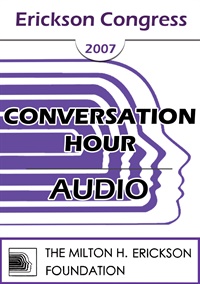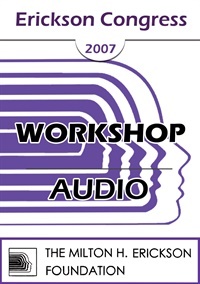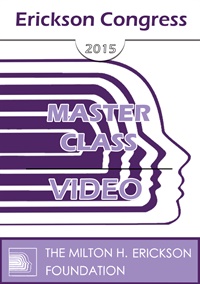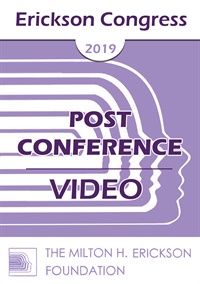
- Average Rating:
- Not yet rated
- Topic Areas:
- Conversation Hours | Self-Relations
- Categories:
- Erickson Congress | Erickson Congress 2007
- Faculty:
- Stephen Gilligan, PhD
- Duration:
- 1:05:54
- Format:
- Audio Only
- Original Program Date:
- Dec 08, 2007
- Short Description:
- IC07 Conversation Hour 03 - Self-Relations Therapy - Stephen Gilligan, PhD
- Price:
- $15.00 - Base Price

- Average Rating:
- Not yet rated
- Topic Areas:
- Workshops | Anxiety | Depression | Ericksonian Hypnosis and Therapy Techniques | Self-Relations | Utilization
- Categories:
- Erickson Congress | Erickson Congress 2007
- Faculty:
- Stephen Gilligan, PhD
- Duration:
- 1:50:36
- Format:
- Audio Only
- Original Program Date:
- Dec 07, 2007
- Short Description:
- A key idea in Milton Erickson's work was that a person's problematic experiences and behaviors can be skillfully accepted and utilized as the basis for therapeutic change. Self-Relations psychotherapy develops this idea further, emphasizing symptoms as indicating the death of an old identity and the impending birth of a new identity. Thus, we don't try to "get rid of" depression, anxiety, or other "acting out/acting in" expressions, but instead invite them into a human relationship of "sponsorship", where their healing and helpful nature may be realized. We will see how a therapist can generate a ritual space where symptoms and other disturbing experiences can be "midwifed" into new identities.
- Price:
- $15.00 - Base Price

- Average Rating:
- Not yet rated
- Topic Areas:
- Ericksonian Psychotherapy | Psychotherapy | Master Classes | Brief Therapy | Ericksonian Hypnosis and Therapy Techniques | Self-Relations | Experiential Therapy | Hypnosis
- Categories:
- Erickson Congress | Erickson Congress 2015 | Master Class
- Faculty:
- Jeffrey Zeig, PhD | Stephen Gilligan, PhD
- Course Levels:
- Master Degree or Higher in Health-Related Field
- Duration:
- 5 Hours 9 Minutes
- Format:
- Audio and Video
- Original Program Date:
- Dec 13, 2015
- Short Description:
- Ericksonian hypnotherapy and the Self-Relations approach are experiential methods of change. In combination they can be synergistic. Psychotherapy is best when clients have a first-hand experience of an alive therapeutic process. Such dynamic empowering experiences pave the way for dynamic understandings. Drs. Gilligan and Zeig will engage with each other and the participants to examine commonalities and differences in their work.
- Price:
- $99.99 - Base Price
- Average Rating:
- Not yet rated
- Topic Areas:
- Master Classes | Ericksonian Psychotherapy | Psychotherapy | Brief Therapy | Hypnotherapy | Self-Relations | Utilization
- Categories:
- Erickson Congress | Erickson Congress 2019
- Faculty:
- Bill O'Hanlon, MS | Jeffrey Zeig, PhD
- Course Levels:
- Master Degree or Higher in Health-Related Field
- Duration:
- 4 Hours 49 Minutes
- Format:
- Audio and Video
- Original Program Date:
- Dec 16, 2019
- Short Description:
- Ericksonian hypnotherapy and the Self-Relations approach are experiential methods of change. In combination they can be synergistic. Psychotherapy is best when clients have a first-hand experience of an alive therapeutic process. Such dynamic empowering experiences pave the way for dynamic understandings. Bill O’Hanlon and Jeffrey Zeig will engage with each other and the participants to examine commonalities and differences in their work.
- Price:
- $59.00 - Base Price
- Average Rating:
- Not yet rated
- Topic Areas:
- Clinical Demonstrations | Psychology | Self-Relations
- Categories:
- Erickson Congress | Erickson Congress 1994
- Faculty:
- Stephen Gilligan, PhD
- Course Levels:
- Master Degree or Higher in Health-Related Field
- Duration:
- 55:59
- Format:
- Audio and Video
- Original Program Date:
- Dec 10, 1994
- Short Description:
- IC94 Clinical Demonstration 09 - SELF-RELATIONS PSYCHOLOGY - Stephen Gilligan, Ph.D.
- Price:
-
Sale is $29.00
price reduced from Base Price - $59.00
Please wait ...



